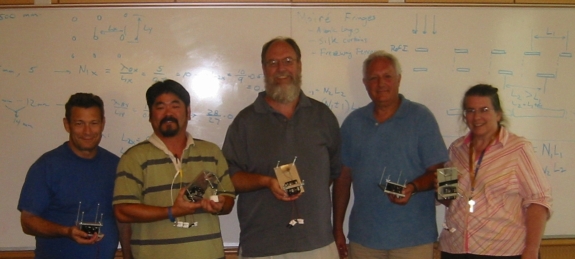Teaching (UC Berkeley)
Microscale Thermophysics and Heat Transfer (ME 259)
Graduate Course
This course introduces advanced statistical thermodynamics, nonequilibrium thermodynamics, and kinetic theory concepts used to analyze thermophysics of microscale systems and explores applications in which microscale transport plays an important role.
Heat Conduction (ME 251)
Graduate Course
Analytical and numerical methods for the determination of the conduction of heat in solids.
Advanced Conductive and Radiative Transport (ME 250A)
Graduate Course
Fundamentals of conductive heat transfer. Analytical and numerical methods for heat conduction in rigid media. Fundamentals of radiative transfer. Radiative properties of solids, liquids and gas media. Radiative transport modeling in enclosures and participating media.
Advanced Heat Transfer (ME 151)
Undergraduate Course
Basic principles of heat transfer and their application. Subject areas include steady-state and transient system analyses for conduction, free and forced convection, boiling, condensation and thermal radiation.
Conductive and Radiative Transport (ME 151A)
Undergraduate Course
Fundamentals of conductive heat transfer. Analytical and numerical methods for heat conduction in rigid media. Fundamentals of radiative transfer. Radiative properties of solids, liquids and gas media. Radiative transport modeling in enclosures and participating media.
Heat Transfer (ME 109)
Undergraduate Course
This course covers transport processes of mass, momentum, and energy from a macroscopic view with emphasis both on understanding why matter behaves as it does and on developing practical problem solving skills. The course is divided into four parts: introduction, conduction, convection, and radiation.
Thermodynamics (ME 40)
Undergraduate Course
This course introduces the fundamentals of energy storage, thermophysical properties of liquids and gases, and the basic principles of thermodynamics which are then applied to various areas of engineering related to energy conversion and air conditioning.NSF SPIRIT Program

July 2009. Five high school science teachers and their new thermoelectric demonstration rigs, made as part of the NSF SPIRIT program.

July 2010: Year 2 of the NSF SPIRIT program, and six more high school science teachers. (This year we followed Ram Seshadri's suggestion and used D cells rather than AA.)
Additional resources about the thermoelectrics demo
Suggested discovery exercises, e.g. for a teacher to run in their classroom.
Brief parts list used in the 2010 SPIRIT workshop.